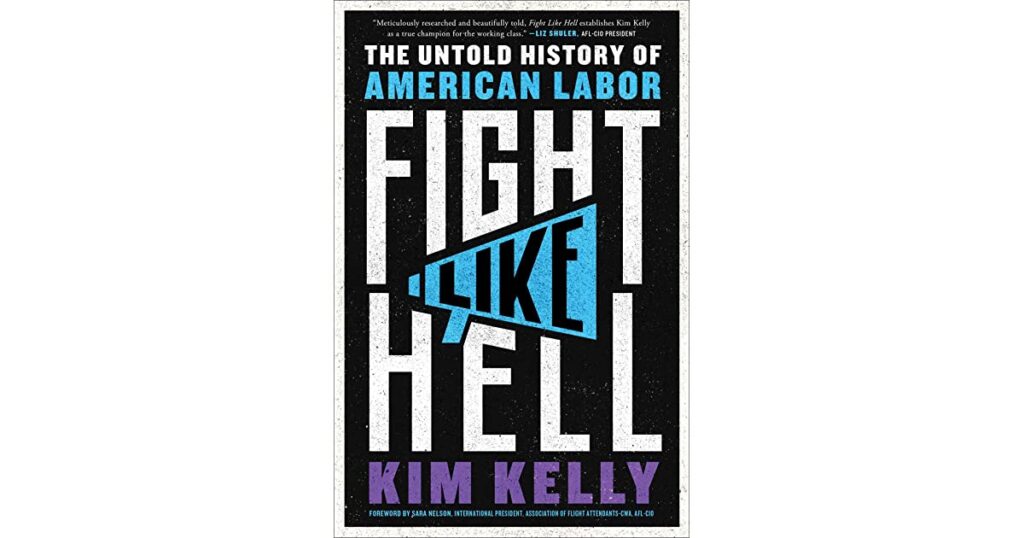Many of us were introduced to the straight-shooting, deep-thinking, heavy-metal-covering reporter Kim Kelly via her work as labor columnist at that hotbed of radical thought, Teen Vogue. In 2022, this is the gig of a heroine—one who knows that the traditional methods of imparting radical education (pocket-sized Communist tracts and, I don’t know, Jacobin?) are due for an update. Flash forward, and we finally have our hands on Kelly’s first book Fight Like Hell: The Untold History of American Labor (Atria/One Signal Publishers.) It’s not often one takes pride in United States lore. But through the book’s re-centralization of the history of workers’ struggle, the reader is encouraged to do just that. Cue the Beyoncé—not that track! There you go. Fight Like Hell is a tome well-worth reading amidst the Big-Freedia-led Great Resignation.
Good timing? Amid school shootings, the Supreme Court dialing back our progress on human rights by 50 years, the approaching storm cloud of mid-term elections in which no one wants to vote for anyone, and the even-larger blotch on the horizon that is 2024, few of us are feeling a lot of love for this dumpster fire of a country. But (and I say this with all the self-seriousness of a person who left the United States to live in another country during the Obama administration), the US is our mess to clean. As we stare at blazing catastrophe in front of us, it helps to have Fight Like Hell in our clean-up kits, along with the fire extinguishers and mops.

Every page of the book serves as reminder that the history of our country is not just that of the “gangsters of capitalism” (as Jonathan Myerson Katz’s insightful new book calls our home-grown purveyors of at-home inequity and global colonialism), but also those who opposed them on their home turf, and clocked major wins. The eight-hour work-week and the weekend? Those rights were not a thing until working people won them by striking, often over and over again, across the nation, at great risks to their personal stability, safety, and sanity, until their bosses understood who who was really running this show. There’s been a lot of bad in the United States. But in Fight Like Hell, we have a rundown of our much-good—even if the forces of light haven’t always come out on top.
Happily, the release comes at a time in which United States workers’ movement is having a moment. Starbucks workers are leading the way, with Amazon warehouse employees just behind them, providing a playbook to employees of other corporations once thought immune to unionization. Approval of labor unions is higher than it’s been in decades. In this respect, Kelly’s deadline came at what could have been an awkward time—she was turning the book in as the Starbucks and Amazon campaigns were beginning to ignite. But amidst the historic kaleidoscope of labor wins and hard-fought battles, their omission is hardly noticeable, especially given the ink that has been dedicated to covering these (very important to support!) organizing campaigns.
For similar reasons, it’s also understandable that Kelly couldn’t find space for the rising tide of media workers who are forming unions, even if she herself was an integral part of a successful organizing campaign at the Proud Boy founder-founded empire of VICE Media.
“There is always another struggle to join, and another picket line to walk,” she writes, noting print’s inability to cover everything, all the time. “Labor’s cause is eternal, and its work is never done.”

Kelly also skirts around the names you probably already know from the US labor movement in the book’s hundreds of historical vignettes, shedding light instead on the legions of their less-famous, equally-heroic peers. Rather than César Chávez, Kelly focuses on trilingual, speaker-of-five-Filipino-dialects United Farmworkers organizer Larry Dulay Itliong—whose work made the multicultural movement viable—and Yemeni UFW activist Nagi Daifullah, who became the union’s first martyr when he was assassinated by the police in 1973. Instead of re-hashing Martin Luther King Jr.’s bio leading up to his final, fateful “I’ve Been to the Mountaintop” speech for striking Memphis sanitation workers, she goes deep on queer Civil Rights leader Bayard Rustin, organizer behind the March on Washington and close King associate.
Given the additional perils faced by BIPOCs, LGBTQIAs, and women in the workplace, it’s no surprise that they emerge as the motor behind the greatest wins for social justice in US history in Fight Like Hell. Kelly gives young women workers in brutal New England mills and the Black-led International Brotherhood of Sleeping Car Porters their dues as major drivers of the country’s labor movement. The architect of the New Deal, it turns out, was not President Franklin D. Roosevelt, but suffragist Frances Perkins, who became the first woman to hold a position in the presidential cabinet in 1932 and went on to mastermind the Social Security program. Industrious wives who have kept the Warrior Met Coal workers strike going are held up—the often-invisible iron backbone of community that is necessary to win a battle against monied bosses.
Valiant labor reporters like Marvel Cooke, the Black woman who went undercover as a Brooklyn domestic worker to report on the industry’s inequities, and Ida B. Wells, who reported on the conspiracy against the sharecropping Black cotton farmers of the Elaine Twelve, get their roses.
Surely Fight Like Hell’s biggest triumph is in its wide-sweeping, sharply-accurate definition of what makes a worker (essentially, as a person who works—rather than a person who traditionally been recognized as deserving of federal workplace protections.) “The largest minority group in the US”—disabled people—is hailed as a source of some of the most radical leaders of all. Kelly, who has a physical disability of her own, locates the fight for justice among historically-oppressed sideshow workers squarely in the labor movement, where it belongs. She recounts a seminal protest in 1990 when 60 disabled protestors left their wheelchairs behind to crawl up the steps of the US Capitol to bring attention to a lack of regulations guaranteeing handicapped access in federal buildings.
Brutal attempts throughout history to exclude immigrant workers from justice are also examined, like the massive 1917 Bisbee Deportation of Mexican mineworkers, many of whom had been born in the US. Immigrant victories are presented for the major triumphs they are, such as that of the Coalition of Immokalee Workers’ and its life-saving agricultural workplace monitoring program, onto which 14 corporate behemoths have signed, from Walmart to McDonald’s.
The approachably written book, based on Kelly’s reporting through the years, is largely ordered by types of jobs rather than by identity markers. But once the reader wades into Kelly’s chapter on transportation workers (“The Movers”), they will quickly recognize a treasure trove of LGBTQIA resistance. Queers have long been attracted to jobs that take them on the road and away from stifling home lives, after all. Kelly neatly weaves together the importance of the sea-going Marine Employees Beneficial Association’s groundbreaking work on including anti-homophobia clauses in bargaining contracts with the campy, community-affirming union hall decorations of the MEBA’s Manuel “Honolulu Queen” Cabral.
She presents the radical queer and trans truck drivers of San Francisco’s Teamsters Local 888 and its “multiracial and queer-affirming” campaigns against the famously bigoted Coors corporation. Kelly calls women-and-queen-dominated 1980s-era Association of Professional Flight Attendants “the Gipper’s worst nightmare,” and sings the praises of its out lesbian president Patt Gibbs.
Final chapters of Fight Like Hell are dedicated to groups of workers whose struggles have long resonated well outside their industries: sex workers (who bring “essential knowledge, militancy, and energy,” to the labor movement, according to Kelly) and incarcerated workers. The latter group is given special consideration, perhaps because it offers the starkest vision of “traditional” organizing’s Achilles heel when it comes to exclusionary leadership. Organized labor is portrayed as ignoring prison strikes at risk of its own coherence: whose salaries, after all, are suffering due to the fact that 650 correctional institutions in the United States that provide prison labor to corporations?
“Incarcerated people have always been a part of the workforce, and as such, a part of the labor movement, even if the movement itself has failed to recognize that,” writes Kelly.
Kelly’s import on today’s labor beat becomes obvious, even as publications happily locate more and more scribes in its scope (even the Washington Post recently named Lauren Kaori Gurley as a dedicated labor reporter.) Kelly enjoys support from big union organizations—Liz Shuler, president of the AFL-CIO even provides Fight Like Hell’s cover blurb. But Kelly does not hesitate to criticize that national organization’s failure to recognize modern-day prison strikes, its inclusion of cop unions in its membership—or the AFL’s history of discrimination against Latine and Asian workers.
She can honor the heroes of the past, while holding them accountable for failings in intersectionality, for the good of the future. She can dive into historical record to find the leaders whose work we’re not meant to remember. This is A MOOD IN 2022.
I’m adding Fight Like Hell to a short list that includes Sesame Street, Goldfish crackers, Angela Davis, and being able to flush toilet paper. Things that make me proud to be an “American” (gag.) Brothers and sisters, we need them.
Buy Fight Like Hell: The Untold History of American Labor here.




